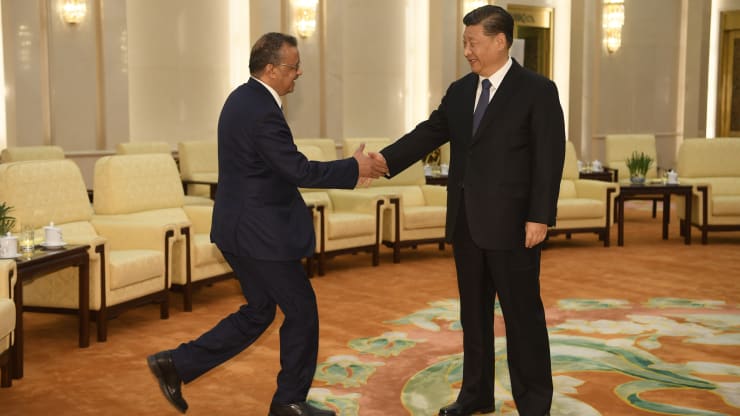
China’s Xi backs WHO-led review of covid-19 outbreak, proposes aid for developing world
Chinese leader Xi Jinping called on the world Monday to rally behind the World Health Organization (WHO) and support developing countries as he opened a WHO annual assembly after weeks of acrimonious jostling between China and the United States and its allies over a proposal to investigate the origins of covid-19.
Xi’s speech, delivered over video at the invitation of WHO Director-General Tedros Adhanom Ghebreyesus, signaled a growing sense of assuredness from China.
Advertisement
For weeks it had been anticipating — and bitterly opposing — a proposal from Western countries to conduct an international probe into the pandemic’s beginnings, generally believed by scientists to be in the central Chinese city of Wuhan.
China’s opposition has melted in recent days as international support for an inquiry grew to include Russia, Turkey and European and African countries, and as drafts of the proposed resolution showed a focus on international collaboration to manage the pandemic, with relatively limited emphasis on questioning its source.
Another prospect that China opposed vehemently — a Taiwanese presence at the World Health Assembly — also dissolved Monday after Foreign Minister Joseph Wu said Taiwan would withdraw its bid for observer status, which Beijing had resisted.
Xi used his speaking platform on Monday to not only support the mooted international review once the pandemic was over but to air his own initiatives.
Framing China as a defender of the international community and particularly the developing world, Xi announced a $2 billion donation to the international fight against covid-19 and offered to help set up hospitals and health infrastructure in Africa.
In an address that contained repeated references to China’s support for multilateral institutions and developing countries, particularly in Africa, Xi appeared to be differentiating himself from Trump at a time when the two countries are locked in a duel over economic primacy and global influence.
Any vaccines produced by China would also be considered a global public good and shared, Xi said.
He called on countries to lend their support to the critical work of the WHO and Tedros after both were accused by President Trump of deference to the Chinese government.
Trump ordered a temporary freeze on WHO funding in April and said on Twitter this weekend he is weighing how to proceed.
Although Xi did not specify a recipient for his $2 billion pledge, that amount would overshadow the amount of WHO funding that the United States promised before it was frozen last month.
During the 2018-2019 two-year period, the United States committed to contributing about $893 million to the WHO budget, which came to $5.6 billion in total, according to funding data published by the agency.
“At this critical juncture, to support the WHO is to support international cooperation and the battle to save lives,” Xi said. “China takes as its responsibility not only the lives and health of its citizens but global public health.”
Rather than address criticisms that Chinese officials covered up early signs of the outbreak in Wuhan, Xi called on the world to “step up information sharing.” China provided information to the WHO and other countries in a timely fashion and released the genome sequence of the coronavirus at the earliest time, he said.
“All along we have acted with openness, transparency and responsibility,” Xi said. “We have done everything in our power to support and assist countries in need.”
The Chinese government has repeatedly characterized the pandemic as a crisis that is global in nature and called any targeted inquiry that draws undue attention to covid-19’s roots in Wuhan as a ploy by Washington and its allies to make it a scapegoat.
Chinese officials and state media responded furiously last month after Australian officials suggested that agencies like the WHO, which have relatively limited powers, should be able to swiftly dispatch investigators to the site of emergencies.
Following the Australian comments, China threatened to boycott Australian products. Last week, it effectively cut imports of Australian beef on technical grounds; on Monday, its Commerce Ministry announced it would impose 80 percent tariffs on Australian barley as part of a long-standing anti-dumping investigation.
But Xi reversed course on the proposal during his speech, saying he supports efforts to improve response times for future public health emergencies and would back a review as long as it were “objective and impartial” — and held after the pandemic was under control.
The draft resolution, submitted by the European Union on Monday and supported by more than 100 nations, does not mention Wuhan or China. It asks the World Health Organization to work with other United Nations agencies to “identify the zoonotic source of the virus and the route of introduction to the human population, including the possible role of intermediate hosts.”
The document does not propose a review to identify missteps in how countries handled the outbreak and is instead forward-looking. It calls on the WHO to potentially arrange “scientific and collaborative field missions” to help prevent similar future outbreaks. It also appears to rule out the possibility that the virus was man-made or experimented upon — a possibility that U.S. officials have raised but that is considered unlikely by most epidemiologists.
It is not clear whether the Trump administration will also back the resolution.
Speaking to reporters Monday, Chinese Foreign Ministry spokesman Zhao Lijian said China supported an international inquiry all along. A review that focused on combating discrimination, finding the zoonotic source of the virus and assessing the performance of the WHO response was “consistent with the Chinese position,” he said.
Before Xi's speech, official Communist Party media outlets warned the United States against politicizing the assembly or turning the WHO into a tool for “geopolitical games.”
“A politicized appeal won’t be supported at the assembly,” the Global Times said in an editorial. “The U.S. has messed up its covid-19 fight but intends to shift the responsibility to China. Such a plan is bound to backfire.”
source: Washington Post




